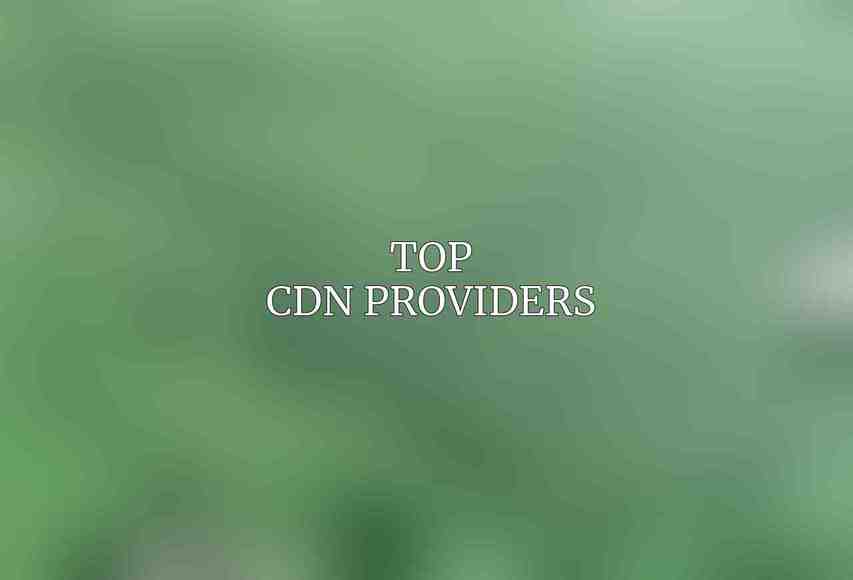Content Delivery Networks (CDNs) are a crucial component of modern web infrastructure, designed to enhance the delivery speed and performance of websites by effectively distributing content across servers located in various geographic locations. The primary purpose of CDNs is to reduce latency, optimize content delivery, and improve user experience by ensuring faster access to website resources. In this digital world, where attention spans are short and competition is fierce, the speed and performance of a website play a pivotal role in attracting and retaining visitors.
Website speed and performance are critical factors that significantly impact user engagement, conversion rates, and overall success in the online world. Slow-loading websites have been shown to drive users away, leading to increased bounce rates and decreased conversions. Consequently, by leveraging CDNs, website owners can effectively enhance their site performance by accelerating page loading times, improving responsiveness, and optimizing content delivery to meet user expectations.
CDN Benefits for Websites

A. Faster Page Loading and Improved User Experience
- Reduced Latency and Faster Content Delivery Across Locations: CDNs leverage a network of distributed servers to store cached content closer to end-users, thereby reducing the physical distance data has to travel and minimizing latency.
- Improved Website Responsiveness and Interaction: By serving content from the nearest server, CDNs enable quicker loading times, seamless navigation, and enhanced user interactions, resulting in a more satisfying browsing experience.
B. Increased Website Accessibility and Availability
- Global Distribution of CDN Servers for Improved Reach: CDNs operate servers worldwide, ensuring that content is readily available to users regardless of their location, thereby expanding website accessibility and reach.
- Reduced Downtime and Improved Website Uptime: With load balancing mechanisms and redundant servers, CDNs can mitigate traffic spikes, prevent server overloads, and minimize downtime, ensuring continuous website availability.
C. Enhanced Scalability and Reliability
- Automatic Load Balancing and Traffic Distribution: CDNs use intelligent algorithms to distribute traffic efficiently across servers, enabling websites to handle fluctuations in visitor volume without performance degradation.
- Redundant Servers for Increased Availability and Reliability: By replicating content on multiple servers, CDNs offer a fail-safe mechanism that ensures data availability even in the event of server failures, enhancing website reliability.
D. Reduced Bandwidth Costs
- Offloading Content Delivery from Origin Servers: CDNs reduce the burden on origin servers by offloading content delivery tasks to edge servers, helping to decrease bandwidth consumption and server loads.
- Optimized Content Caching and Compression Techniques: CDNs employ advanced caching and compression techniques to minimize the size of data transferred, leading to faster loading speeds and reduced bandwidth usage, ultimately lowering costs for website owners.
E. Improved Security and Data Protection
- DDoS Mitigation and Protection Against Cyber Threats: CDNs offer robust security features, such as DDoS protection and Web Application Firewall (WAF), to safeguard websites against malicious attacks and ensure continuous availability.
- Secure Socket Layer (SSL) Encryption for Data Security: By encrypting data transmitted between servers and users, CDNs enhance data privacy and protect sensitive information from unauthorized access, boosting overall website security.
Top CDN Providers

When it comes to choosing a CDN provider, there are several key players in the industry that offer a range of features and pricing options to meet diverse website needs. Some of the top CDN providers include:
| CDN Provider | Key Features | Pricing |
|---|---|---|
| CloudFlare | WAF, DDoS protection, image optimization | Free plan available, paid plans from $20/month |
| Amazon CloudFront | Global CDN, customizable caching, video streaming | Pay-as-you-go pricing based on usage |
| Akamai | Enterprise-grade CDN, DDoS mitigation, data analytics | Custom pricing based on requirements |
| Google Cloud CDN | Integration with Google Cloud Platform, high-speed caching | Pay-as-you-go pricing based on usage |
| Fastly | Real-time analytics, custom domain support, image optimization | Custom pricing based on requirements |
Choosing the Right CDN for Your Website

A. Factors to Consider:
- Website Size and Traffic Volume: Evaluate the amount of content and traffic your website experiences to select a CDN that can efficiently handle your requirements.
- Geographic Reach and Target Audience: Consider the locations of your target audience to ensure that the CDN provider has servers strategically positioned to deliver content effectively.
- Budget and Pricing Structure: Determine a budget for CDN services and compare pricing plans to find a solution that aligns with your financial capabilities.
- Features and Functionalities Required: Identify specific features like security protocols, caching mechanisms, and scalability options needed for your website to operate optimally.
B. Tips for Choosing a CDN:
- Evaluate Your Website’s Needs and Goals: Understand your website requirements and objectives to make an informed decision when selecting a CDN provider.
- Compare Different CDN Providers and Pricing Plans: Research and compare offerings from various providers to find a solution that best suits your website’s demands and budget constraints.
- Consider the Technical Expertise Required for Implementation: Assess the level of technical expertise needed to integrate and manage the chosen CDN effectively, ensuring a smooth implementation process.
- Seek Support from CDN Providers When Needed: Reach out to CDN providers for assistance, guidance, and support to address any issues or challenges that may arise during the implementation and maintenance of the CDN solution.
leveraging CDNs offers a multitude of benefits for website owners, ranging from improved performance and scalability to enhanced security and cost savings. Choosing the right CDN provider is paramount in maximizing these advantages and ensuring optimal website performance. By understanding the features, pricing options, and considerations involved in selecting a CDN, website owners can pave the way for success in a competitive online environment, ultimately driving user satisfaction and achieving business objectives. With the exponential growth of online content consumption and the increasing demand for fast, reliable, and secure websites, CDNs have become indispensable tools for enhancing website performance and delivering exceptional user experiences.
Frequently Asked Questions
What is a CDN?
A CDN (Content Delivery Network) is a system of servers distributed globally to help deliver web content to users more efficiently.
How does a CDN enhance website performance?
CDNs reduce load times by caching content closer to users, resulting in faster delivery of web pages, images, videos, and other assets.
What are the benefits of leveraging a CDN for a website?
Some benefits of using a CDN include improved website speed, increased reliability, enhanced security, and reduced server load.
How can I implement a CDN for my website?
To implement a CDN, you typically sign up with a CDN provider, configure your website to use the CDN’s services, and adjust settings to optimize performance.
Are there any downsides to using a CDN?
While CDNs offer many advantages, potential downsides include cost, complexity of setup, and the need to ensure proper configuration and monitoring for optimal results.

